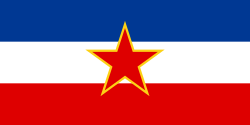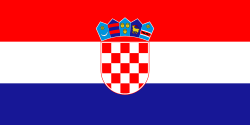Wikimedia Commons has media related to Flags of Yugoslavia .
This is a list of flags that were used by and in Yugoslavia.
Contents
- National and civil flags
- Proposed flags
- Military flags
- Army flags
- Air force flags
- Naval ensigns
- Naval jacks
- Defence Ministry Flags
- Rank flags
- Government flags
- Governmental
- Monarchical
- Republic flags
- Socialist Republic of Bosnia and Herzegovina
- Socialist Republic of Croatia
- Socialist Republic of Macedonia
- Socialist Republic of Montenegro
- Socialist Republic of Serbia
- Socialist Republic of Slovenia
- Banate flags
- Ethnic communities
- References
- External links






































































































